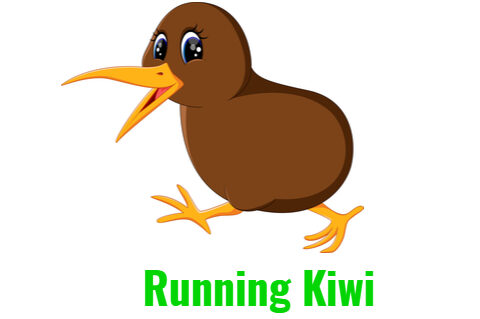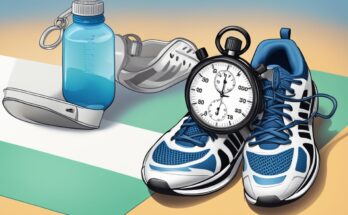Should I Eat before Running in the Morning?
Running is a great way to get some aerobic exercise. It’s almost fun and is a versatile activity that can be tailored to your lifestyle and goals.
But, when it comes to the morning run, how should you start: on an empty stomach or not?

Some people prefer to run with an empty stomach. They often do it in the morning after fasting over the night’s sleep and call it the fasted running. When fasted, carbohydrates stored in glycogen aid them with energy. Conversely, you may believe that breakfast is the most crucial meal of the day. From promoting your metabolism to improving your focus and mood, as well as making you a faster runner.
Ultimately, whether you should run on an empty stomach or a full stomach depends on your physical condition, your training, and your goals. Now let’s figure out whether you should eat before running in the morning or not?
Benefits of Running on an Empty Stomach
Running on an empty stomach may have some potential benefits, including the following:
It May Increase Fat Burning
Running on an empty stomach has been highlighted to enhance the percentage of fat oxidation, which means that more of the calories you burn throughout your running originate from stored body fat.
When you go run, your body draws on stored energy. Carbohydrates are stored in the form of glycogen, fat is stored in the form of triglycerides in adipose tissue, and protein is stored in the form of structural proteins in muscle.
The liver and skeletal muscles have limited glycogen stores, and these levels drop overnight throughout your fast. As a result, when you go fasted running, oxidizing fat supplies a bigger portion of the energy needed to maintain your running.
In this regard, while a fasted running might improve fat burning, it can also raise muscle-burning as the body shifts to metabolizing muscle protein for energy as well.
It may Aid to Greater Weight Loss
Even though running on an empty stomach does not burn more calories, a few studies have found that fasted runners consume fewer calories over the day.
Because weight loss is an ultimate result of a caloric deficit, reducing caloric intake on an empty stomach while running will likely result in more weight loss if it contributes to lower energy consumption over the day.
It may Lower Digestive Distress
Several individuals prefer to run on an empty stomach for certain reasons. Running on an empty stomach helps runners with sensitive stomachs avoid gas, cramping, diarrhea, and bloating.
Even modest snacks can trigger side stitches and the condition to jump into a washroom mid-run for a few runners. Fasted running may be preferable in these worried situations.
It may Be Energizing
Some individuals find that fasted running makes them feel tired and exhausted, while others embrace it saying it makes them feel more energized.
Furthermore, as running on an empty stomach is often done first thing in the morning, some believers of fasted running claim that it helps them begin their day and leaves them feeling ready to go.
It may Boost Blood Sugar Control
The most worried case with fasted running is hypoglycemia or low blood sugar, however, some studies indicate that it does not produce harmful blood sugar drops, even in diabetics.
Running on an empty stomach has even been shown to improve blood sugar control and insulin sensitivity in several studies. After all, If you bear diabetes, it is suggested that you should check your doctor before beginning a fasted running.
Drawbacks of Running on an Empty Stomach
Fasted running isn’t without its drawbacks, such as the ones listed below
It may Reduce Training Intensity
Even though your body can burn fat for fuel, it is not a long-term solution. Fatigue will arise if your fat stores can’t keep up with the demands of your run. This makes bearing a high level of effort or tempo challenging.
When running is undertaken in a fed condition, especially when proper carbs are available, speed, strength, and intensity levels tend to be much higher. Fasted running also has a higher rate of perceived exertion, making the activity feel more difficult than it is.
It may Increase Injury Risk
You’re more prone to feel tired when your energy stores deplete. Fatigue might raise your chances of being injured while running.
Also, your brain requires glucose to function properly. This is especially crucial when exercising because your body operates glucose to fuel your muscles.
Your brain may not gain enough energy if you run fast. It might be more challenging to maintain perfect form while still paying attention to your surroundings.
It may Lead to Muscle loss
Cortisol is a hormone produced by your adrenal glands. Basic processes such as blood glucose and the stress response are directed by it. Cortisol stimulates protein breakdown in muscle cells at high levels. Muscle loss and weakness are increased as a consequence of this.
Early in the morning, your cortisol levels typically are at their maximum. While a study found, morning running following an overnight fast heightens cortisol levels. This means that running on an empty stomach, as is common in the morning, may have a harmful impact on your muscles.
It doesn’t Lead to Long-term Weight Loss
Fasted running has been shown to improve fat burn in some studies, but it may not be the best choice for long-term weight loss as found by other studies.
According to a study, running before and after eating resulted in identical weight loss rates. These findings imply that running while hungry has little effect on body composition.
This is due to the body’s capacity to manage its fuel supply. When you run on an empty stomach and burn a lot of fat, your body adjusts by slowing down fat burning later. Instead, it makes use of more glucose.
Why are Carbs Important for Runners?
An activity that necessitates a good amount of oxygen and energy production— carbohydrates are typically the body’s selected form of fuel. Carbohydrates deliver energy faster, more effectively, and with less oxygen consumption than fat.
According to studies, carbohydrate ingestion before running also boosts the pace at which the body burns carbs during running. Carbohydrates are a vital energy source for runners since the more energy you burn and oxygen you breathe, the faster you can go.
How does Breakfast Make You Faster
Your body’s carbohydrate levels are low when you wake up in the morning after a good night’s sleep. Glycogen stores, unlike fat storage, are small and quickly exhausted during even short fasting periods. When you first wake up, your glycogen levels are like a gas tank, and you’re practically operating on fumes.
By having breakfast, you may form to restore your glycogen stores while also nourishing your muscles with the direct energy they require to operate at their best. While a study found that eating a high-carbohydrate breakfast before an endurance run can boost run capacity by 9% when compared to running on an empty stomach.
Lastly, Which is Better?
In general, it is often recommended to satisfy your stomach before running. This delivers the fuel your body requires to run safely and smoothly. Stick to light to moderate running if you tend to run on an empty stomach. If you want to feel lightheaded, take a rest.
If you will be running a long-distance or undertaking a high-intensity run, you should avoid this step to be fasted. Because these activities require a significant amount of energy, it’s always recommended to eat something before you start.
Finally, consider the benefits and drawbacks of running on an empty stomach or full stomach in terms of your lifestyle and training goals. Then, you can find the accurate answer you are looking for. Have a wonderful morning run!
References:




